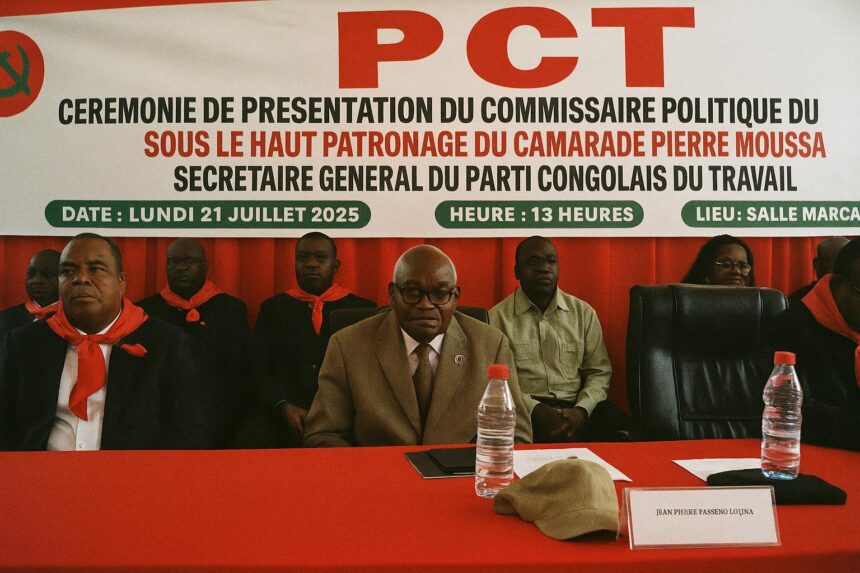Strategic Appointment and Party Dynamics
In the modest yet symbolically charged town of Kinkala, Secretary-General Pierre Moussa formally introduced Jean-Pierre Heyko Lekoba as the Congolese Party of Labour’s Political Commissioner for the Pool. The ceremony, held under a canopy that blended party colours with national flags, may appear procedural; in reality, it marks a decisive stage of the ruling party’s post-congress renewal trajectory articulated since its fifth ordinary congress in 2019 (Agence Congolaise d’Information, 24 July 2023). By replicating this commissariat structure across each of the Republic’s fifteen departments, the PCT seeks to entrench organisational discipline while showcasing a consultative spirit compatible with twenty-first-century governance.
Historical Weight of the Pool Department
No region in Congo-Brazzaville carries the layered significance of the Pool. Situated on the southeastern periphery of Brazzaville yet intrinsically linked to the capital’s security calculus, the department endured repeated cycles of insurgency between 1998 and 2017. The 2017 ceasefire, brokered with active facilitation from national authorities and religious mediators, substantially restored calm, but diplomatic observers continue to list the area among those requiring ‘vigilant accompaniment’ (International Crisis Group, 2022). Against this backdrop, the choice of a trusted party stalwart as political commissioner is widely interpreted as a confidence-building measure aimed at consolidating peace dividends and deterring relapse into instability.
Mandate of the Political Commissioner
Secretary-General Moussa outlined an ambitious remit: the commissioner “is not a passive observer” but rather an architect of anticipatory action able to alert national organs to incipient dysfunctions. In practice, this translates into daily immersion among local cadres, thematic consultations with civil society, and fortnightly analytical reports transmitted to the Political Bureau. According to a senior PCT ideologue reached for comment, the commissioner’s value lies in his dual capacity to ‘hear the unsaid’ at grassroots level and to ‘translate it into actionable policy suggestions’—a skill set especially prized in the Pool, where social fabrics exhibit both resilience and fragility.
Strengthening Party-People Synergy Ahead of 2026
The timing of the Kinkala announcement is inseparable from two milestones on the national calendar: the sixth ordinary congress, anticipated later this year, and the 2026 presidential election. The PCT leadership is mindful that its prospective standard-bearer—widely presumed to be the incumbent president, although the party remains formally silent—will require an electorate convinced of the administration’s attentiveness to regional aspirations. By tasking Commissioner Lekoba with ‘reinforcing confidence between the party and the population’, the Secretariat implicitly recognises that electoral legitimacy in 2026 will hinge less on macroeconomic statistics than on citizens’ tangible sense of inclusion.
Regional Stabilisation and National Cohesion
Beyond partisan calculations, the commissioner’s presence dovetails with state initiatives for post-conflict recovery. Ministries overseeing infrastructure, education and agriculture have rolled out complementary programmes in the Pool, collectively amounting to an estimated 48 billion CFA francs in budgetary allocations over the past three fiscal years (Ministry of Planning data, 2023). Diplomatic missions in Brazzaville have quietly welcomed a governance architecture that blends security sector reform, socio-economic projects and community-level political dialogue. A Central African diplomat summed up the prevailing sentiment: ‘Sustained calm in the Pool is the linchpin for sub-regional corridor connectivity; its importance exceeds Congolese borders.’
Diplomatic Outlook for Brazzaville’s Partners
For external interlocutors—whether multilateral lenders, regional organisations or bilateral partners—Brazzaville’s decision to institutionalise political commissioners signals a maturing of internal monitoring mechanisms. While some analysts caution against excessive centralisation, most acknowledge that early-warning structures anchored in party and state frameworks have historically mitigated governance shocks across the continent. As Congo positions itself to leverage forthcoming oil-to-gas transition revenues and diversify trade corridors, a politically tranquil Pool offers investors and humanitarian agencies alike the predictability they routinely cite as a pre-condition for engagement. In that sense, the commissioner’s mission transcends partisan theater; it constitutes a micro-laboratory for the Republic’s broader agenda of stability, inclusivity and growth.




















